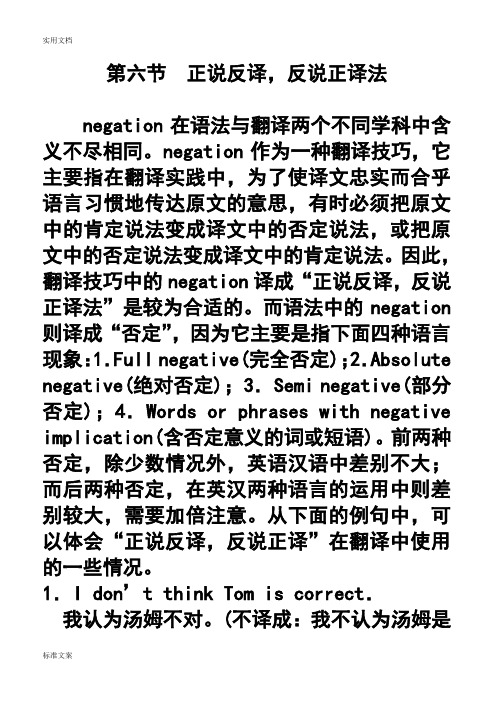英语翻译正说反译反说正译
- 格式:docx
- 大小:19.93 KB
- 文档页数:5

1、正说反译:Miss the bus没有赶上车Live up to the expectations of my parent不辜负父母的期望Be absent from the meeting没有出席会议A final decision不可更改的决定Frost-free refrigerator无霜冰箱Freeze别动Mortally ill不治之症The window refuses to open窗户打不开Children were excluded from getting in the building 儿童不许进入这个房间The explanation is pretty thin这个解释站不住脚I have fallen behind with my correspondence我有一些信件还没有回复Fully clothes, he fell across his bunk and was instantly sleep 衣服也不脱,他往床上横着一倒,不一会儿就睡着了Don’t lose time in posting this letter不要忘了寄这封信No deposit will be refunded unless ticket produced凭票退押金例1:原文:她忍住了没有笑出声。
译文:She refrained from laughing.例2:原文:花园根本无人整理。
译文:The garden was in a state of total neglect.例3:原文:我不能忍受你的脾气。
译文:Your temper is more than I can bear.例4:原文:他宁死不屈。
译文:He would die before yielding.例5:原文:生活远非净是乐事。
译文:Life is far from being a bed of roses.例6:原文:风景美得无以言表。


四种翻译方法1.直译和意译所谓直译,就是在译文语言条件许可时,在译文中既保持原文的内容,又保持原文的形式——特别指保持原文的比喻、形象和民族、地方色彩等。
每一个民族语言都有它自己的词汇、句法结构和表达方法。
当原文的思想内容与译文的表达形式有矛盾不宜采用直译法处理时,就应采用意译法。
意译要求译文能正确表达原文的内容,但可以不拘泥与原文的形式。
(张培基)应当指出,在再能确切的表达原作思想内容和不违背译文语言规范的条件下,直译有其可取之处,一方面有助于保存原著的格调,另一方面可以进新鲜的表达方法。
Literal translation refers to an adequaterepresentation of the original. When the original coincides or almost tallies with the Chinese language in the sequence of vocabulary, in grammatical structure and rhetorical device, literal translation must be used.Free translation is also called liberal translation, which does not adhere strictly to the form or word order of the orig in al.(郭著章)直译法是指在不违背英语文化的前提下,在英译文中完全保留汉语词语的指称意义,求得内容和形式相符的方法。
意译是指译者在受到译语社会文化差异的局限时,不得不舍弃原文的字面意义,以求疑问与原文的内容相符和主要语言功能的相似。
(陈宏薇)简单地说,直译指在译文中采用原作的的表达方法,句子结构与原句相似,但也不排除在短语层次进行某些调整。
意译指在译文中舍弃原作的表达方法,另觅同意等效的表达方法,或指对原作的句子结构进行较大的变化或调整。

第六节正说反译,反说正译法negation在语法与翻译两个不同学科中含义不尽相同。
negation作为一种翻译技巧,它主要指在翻译实践中,为了使译文忠实而合乎语言习惯地传达原文的意思,有时必须把原文中的肯定说法变成译文中的否定说法,或把原文中的否定说法变成译文中的肯定说法。
因此,翻译技巧中的negation译成“正说反译,反说正译法”是较为合适的。
而语法中的negation 则译成“否定”,因为它主要是指下面四种语言现象:1.Full negative(完全否定);2.Absolute negative(绝对否定);3.Semi negative(部分否定);4.Words or phrases with negative implication(含否定意义的词或短语)。
前两种否定,除少数情况外,英语汉语中差别不大;而后两种否定,在英汉两种语言的运用中则差别较大,需要加倍注意。
从下面的例句中,可以体会“正说反译,反说正译”在翻译中使用的一些情况。
1.I don’t think Tom is correct.我认为汤姆不对。
(不译成:我不认为汤姆是对的。
)2.我想小李明天不会来了。
I don’t think Xiao Li will cometomorrow.(不译成:I think Xiao Li won't come tomorrow.)3.A:Are you not going tomorrow?B I'm not going.甲:你明天不去吗?4.①Africa is not kicking out Western imperialism ②in order to invite other new masters.进其他新的统治者。
(假如不运用“正说反译,反说正译”这一技巧,译文就会成为:新的主子。
”其义则大相径庭。
)他来这儿不是为了求得我们的帮助。
误:He came here not to ask us for help.正:He did not come here to ask us for help.否定状语时,英语中的否定词一般不直接置于被否定词语前,通常置于谓语动词前。


翻译常用的八种技巧1.增译法、增词法:amplification2.重译法、重复法:repetition3.省译法、减词法:omission4.词性转换法、词类转移法:conversion5.正说反译、反说正译法:negation6.语态变换法:the change of the voices7.分译法、分句法(OPP:合句法):division8.语序调整法、词序调整法(顺序法与逆序法)inversion增词法译文中添加一些原文没有的词句,表面上看似不忠实于原文,但仔细分析就会发现这些增加的词句所表达的意思并非无中生有,而是隐含在原文中的。
要知道,从一种语言文字向另一种语言文字转换,有时可以找到一种语言文字在另一种语言文字中的对等词,然而要想全部依赖对等词的转换来达到翻译的目的是几乎不可能的。
不同语言文字所持有的习惯决定了必须根据其中一种语言文字的习惯来适当地增词(或减词)达到语言交际的目的。
如果机械地按照字面意义直译,不仅不能表达原文的思想,精神与形象,而且还会使译文前后矛盾,闹出笑话。
例1 听到你平安的消息,非常高兴!译文: I was very glad on hearing that you were in safety!例2对不起,打扰一下!译文: Excuse me for interrupting you!(增补作宾语的代词you)例3 Histories make men wise; poems witty; the mathematics subtle; natural philosophy deep; moral grave; logic and rhetoric able to contend.译文:读史使人明智,读诗使人灵秀,数学使人周密,科学使人深刻,伦理使人庄重,逻辑修辞之学使人善辩。
(译文中添补了谓语和宾语:增词法;重译法)例4:We won’t retreat, we never have and never will.译文:我们不后退,我们从来没有后退过,我们将来也绝不后退。
英语翻译正说反译反说正译第八章英翻译技巧(五)正说反译反说正译正说反译、反说正译的应用不论是正说反译还是反说正译,究其原因归纳起来主要是:保证语义明确、加强修饰效果、尊重汉语习惯,保证译文通畅易懂。
所谓反面表达,是指英语词句中含有“not”,“never”,“no”,“un-”,“im-”,“ir-”,“in-”,“less-”等否定成分,汉语词句中含有“不”、“没”、“无”、“未”、“甭”、“别”、“休”、“莫”、“毋”、“勿”、“非”等否定成份,不含这些成份的为正面表达。
(一)正说反译的应用1.谓语动词或动词词组本身表示否定意义,常见的有:Fail, fizzle out, fall short, be frustrated, escape, elude, slip away, stop, cease, overlook, ignore, neglect, refuse, grudge(怨恨,不情愿做), disdain, reject, turn down, forbid, prohibit, exclude from, bar, ban, expire, be blind to, deny, avoid, omit, forget, prevent from, live up to, resist, miss, lack.I missed what you have said because of the noise outside.由于外面的噪音,我没听清楚你说的话。
To our disappointment, he failed to take the overall situation into account. 使我们失望的是他不顾大局。
Such a chance was denied to me.我没有得到这样一个机会。
2.介词或介词短语含否定之意,常见的词有:Above, against, below, beneath, beyond, instead of, out of, without, but for。
Learn how to be instead of do.要学习如何做人,而不是做事。
The question is above the five-yea-old boy.那个五岁的小孩不懂这个问题。
Out of sight, out of mind.眼不见,心不烦。
But for the storm,we should have arrived earlier.要是没有遇上暴风雨,我们会早到了。
All international disputes must be settled through negotiations instead of any armed conflicts.一切国际争端应通过谈判而不是武装冲突来解决。
3、一些固定结构也是形式肯定,意思否定,例如absent (from), free from, safe from, different (from), far from, few, little,alien to,anything but, know better than(明白而不至于), too…to…, rather than,awkward(不熟练、不灵活、使用起来不方便),bad(令人不愉快的,不受欢迎的、不舒服的),blind to (看不到、不注意),dead(无生命的、无感觉的、不毛的),difficult(不容易的),foreign to(不适于,与……无关),short of(不足,不够),poor(不好的,不幸的),ignorant of(不懂)He knows better than to do such a thing.他不至于干这样的事。
His work is far from satisfactory.他的工作远远不能令人满意。
The problem is anything but easy.这个问题可决不容易。
He is more brave than wise.他有勇无谋4.含有if, before, unless,would rather 的从句或虚拟语气的句子,如:Jump down from the roof of the building. If you dare.我猜你也不敢从房顶上跳下来。
She will die of hunger before she steals.他宁愿饿死也小愿去偷。
I would rather die before I would betray my country.我宁可死,也不背叛我的祖国。
The troops would rather take a roundabout way than tread on the crops.部队宁可绕道走,也不踩庄稼。
5、许多英语习语从正面表达,习惯上却从反面加以翻译,如:He was utterly in the dark about what had happened in the department yesterday.他对昨天系里发生的事全然不知。
Leave me alone!别管我!Seeing is believing.百闻不如一见。
Better be the head of a dog than the tail of a lion.宁为鸡头,不做凤尾。
(二)反说正译的应用1.双重否定You cannot make omelettes without breaking eggs.有失才有得/不破不立We must never stop taking an optimistic view of life. 我们对生活要水远抱乐观态度。
Nothing is impossible to a willing mind.有志者事竟成。
There is no evil without compensation. 恶有恶报。
He can hardly open his mouth without talking shop. 他一开口总是三句话不离本行。
2.否定的形式表示肯定的意思Your article will be published in no time.你的文章很快就会刊发的。
I couldn't feel better. 我觉得身体好极了。
I couldn't agree with you more. 我太赞成你的看法了。
If that isn’t what I want!我所要的就是这个呀!He can't see you quick enough. 他很想尽快和你见面。
课后练习:take French leave不辞而别beyond dispute无可争论frost/Freon-free refrigerator无霜冰箱an ice-free harbour不冻港Keep upright切勿倒置Free from anxiety无忧无虑Free from arrogance and rashness不骄不躁。
wet Paint!油漆未干!I won’t keep you waiting long.我一会而就回来。
Crew only !闲人莫入!No Admittance !禁止入内!/谢绝参观!Hold the line, please!请别挂断!Be generous with your praise!不要吝惜对他人的赞扬。
No deposit(存款,定金)will be refunded unless ticket produced.凭票退回押金。
I have read your article. I expected to meet an older man.拜读了您的大作,没想到您这样年轻。
As the saying goes, “ Men only weep when deeply hurt.”俗话说,“男儿有泪不轻弹,皆因未到伤心处”嘛。
There is not any advantage without disadvantage有一利必有一弊。
Keep Off the Grass 请勿践踏草坪He is the last man to accept a bribe.他决不会接受贿赂。
He has a short memory. 他记性不好。
He yelled “freeze!”他喊到“别动!”It's too dark here for us to read the words on this slip of paper.这里光线太暗了,看不出这个便条上写的字。
There is no rule that has no exception.任何规则都有例外。
Opportunity knocks but once.机不可失It never rains but it pours.不下则已,一下倾盆/不鸣则已一鸣惊人.The sea food goes against my stomach.海鲜不合我口味。
His speech leaves no room to improvement.他的演讲完美之至。
Children were excluded from getting in the building.儿童不许进入这个房间。
As a result, many people avoided the very attempts that are the source of true happiness.结果,很多人没有尝试,而这些尝试正是幸福的源泉。
Her child was in a terrible state of neglect.她的孩子简直没人管。
The window refuses to open.窗户打不开。
He is no more thana puppet.他只是一个傀儡。
A poor man is no less a citizen than a rich man. 穷人、富人都是人。
Nothing is more precious than life.生命最可贵。
He can' t be more careless.他太粗心了。
Don' t lose time in posting this letter.赶快把这封信寄出去。
Bite off more than one can chew.贪多嚼不烂。
Let sleeping dogs lie.莫惹事生非。
A bird in the hand is worth two in the bush.双鸟在林不如一鸟在手。